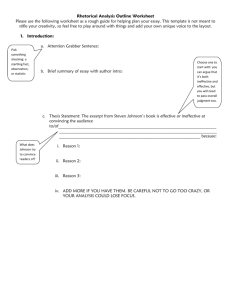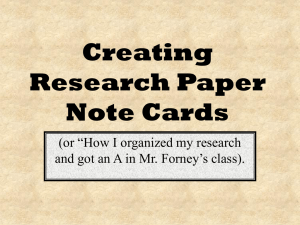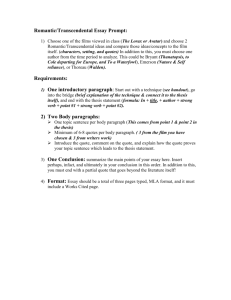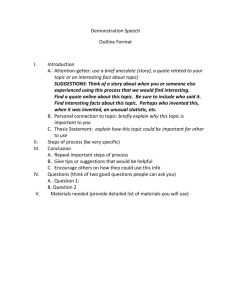Thesis statement
advertisement
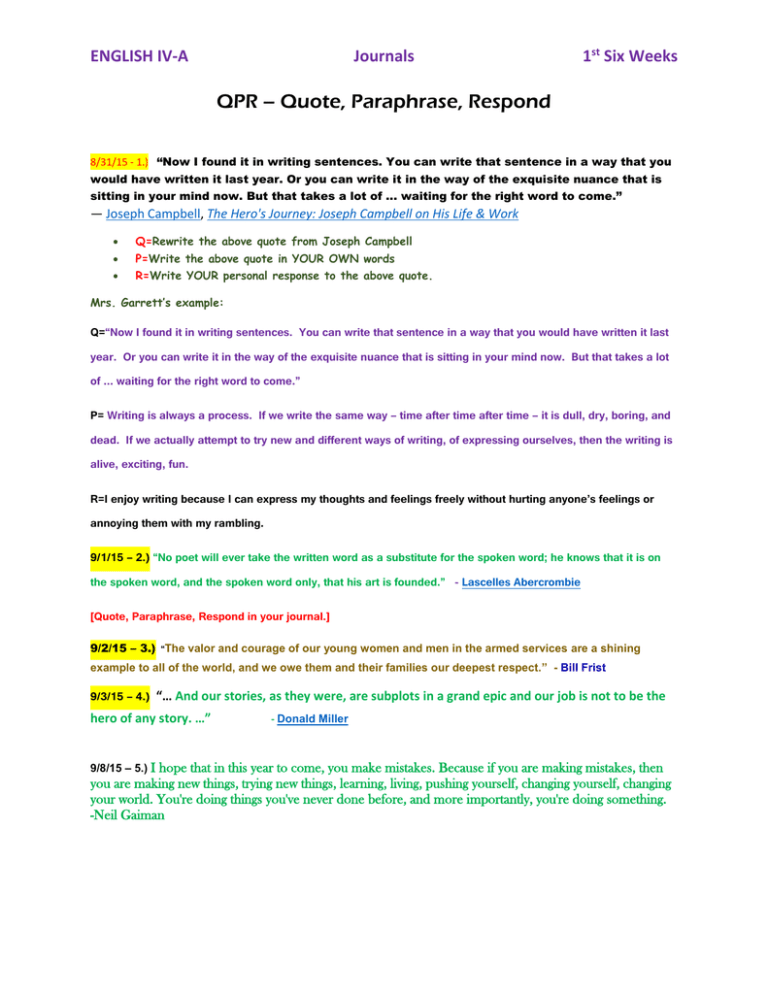
ENGLISH IV-A Journals 1st Six Weeks QPR – Quote, Paraphrase, Respond 8/31/15 - 1.) “Now I found it in writing sentences. You can write that sentence in a way that you would have written it last year. Or you can write it in the way of the exquisite nuance that is sitting in your mind now. But that takes a lot of ... waiting for the right word to come.” ― Joseph Campbell, The Hero's Journey: Joseph Campbell on His Life & Work Q=Rewrite the above quote from Joseph Campbell P=Write the above quote in YOUR OWN words R=Write YOUR personal response to the above quote. Mrs. Garrett’s example: Q=“Now I found it in writing sentences. You can write that sentence in a way that you would have written it last year. Or you can write it in the way of the exquisite nuance that is sitting in your mind now. But that takes a lot of … waiting for the right word to come.” P= Writing is always a process. If we write the same way – time after time after time – it is dull, dry, boring, and dead. If we actually attempt to try new and different ways of writing, of expressing ourselves, then the writing is alive, exciting, fun. R=I enjoy writing because I can express my thoughts and feelings freely without hurting anyone’s feelings or annoying them with my rambling. 9/1/15 – 2.) “No poet will ever take the written word as a substitute for the spoken word; he knows that it is on the spoken word, and the spoken word only, that his art is founded.” - Lascelles Abercrombie [Quote, Paraphrase, Respond in your journal.] 9/2/15 – 3.) “The valor and courage of our young women and men in the armed services are a shining example to all of the world, and we owe them and their families our deepest respect.” - Bill Frist 9/3/15 – 4.) “… And our stories, as they were, are subplots in a grand epic and our job is not to be the hero of any story. …” 9/8/15 – 5.) I - Donald Miller hope that in this year to come, you make mistakes. Because if you are making mistakes, then you are making new things, trying new things, learning, living, pushing yourself, changing yourself, changing your world. You're doing things you've never done before, and more importantly, you're doing something. -Neil Gaiman ENGLISH IV-A Journals 1st Six Weeks 9/9/15 – 6. Quote, Paraphrase, Respond: When you are old When you are old and gray and full of sleep, And nodding by the fire, take down this book, And slowly read, and dream of the soft look Your eyes had once, and of their shadows deep; How many loved your moments of glad grace, And loved your beauty with love false or true, But one man loved the pilgrim soul in you, And loved the sorrows of your changing face; And bending down beside the glowing bars, Murmur, a little sadly, how love fled And paced upon the mountains overhead And hid his face amid a crowd of stars. -William Butler Yeats- 1892 9/10/15 – 7. Quote, Paraphrase, Respond: “For instance, on the planet Earth, man had always assumed that he was more intelligent than dolphins because he had achieved so much—the wheel, New York, wars and so on—whilst all the dolphins had ever done was muck about in the water having a good time. But conversely, the dolphins had always believed that they were far more intelligent than man—for precisely the same reasons.” ― Douglas Adams, the Hitchhiker's Guide to the Galaxy 9/11/15 – 8. Quote, Paraphrase, Respond: “The Road goes ever on and on Down from the door where it began. Now far ahead the Road has gone, And I must follow, if I can, Pursuing it with eager feet, Until it joins some larger way Where many paths and errands meet. And whither then? I cannot say” ― J.R.R. Tolkien, The Fellowship of the Ring 9/15/15 – 9. Quote, Paraphrase, Respond: “It is impossible to live without failing at something, unless you live so cautiously that you might as well not have lived at all - in which case, you fail by default.” ― J.K. Rowling 9/16/15 – 10. Quote, Paraphrase, Respond: “To be, or not to be- that is the question: Whether 'tis nobler in the mind to suffer ENGLISH IV-A Journals 1st Six Weeks The slings and arrows of outrageous fortune Or to take arms against a sea of troubles, And by opposing end them. To die- to sleepNo more; and by a sleep to say we end The heartache, and the thousand natural shocks That flesh is heir to. 'Tis a consummation Devoutly to be wish'd. To die- to sleep. To sleep- perchance to dream: ay, there's the rub! For in that sleep of death what dreams may come When we have shuffled off this mortal coil, Must give us pause. There's the respect That makes calamity of so long life.” -William Shakespeare, Hamlet, Act 3, Scene 1 9/17/15 – 11. Quote, Paraphrase, Respond: Wish But what if, in the clammy soil, her limbs grew warmer, shifted, stirred, kicked off the covering of earth, the drowsing corms, the sly worms, what if her arms reached out to grab the stone, the grooves of her dates under her thumb, and pulled her up? I wish. Her bare feet walk along the gravel path between the graves, her shroud like washing blown onto the grass, the petals of her wreath kissed for a bride. Nobody died. Nobody wept. Nobody slept who couldn’t be woken by the light. If I can only push open this heavy door she’ll be standing there in the sun, dirty, tired, wondering why do I shout, why do I run. -Carol Ann Duffy, 2002 9/18/15 - #12 – “A narrative is like a room on whose walls a number of false doors have been painted; while within the narrative, we have many apparent choices of exit, but when the author leads us to one particular door, we know it is the right one because it opens.” - John Updike (American writer, b.1932) ENGLISH IV-A Journals 1st Six Weeks 9/21/15 - #13 – "Fantasy is escapism, but wait... Why is this wrong? What are you escaping from, and where are you escaping to? Is the story opening windows or slamming doors? The British author G.K. Chesterton summarized the role of fantasy very well. He said its purpose was to take the everyday, commonplace world and lift it up and turn it around and show it to us from a different perspective, so that once again we see it for the first time and realize how marvelous it is. Fantasy - the ability to envisage the world in many different ways - is one of the skills that make us human." — Terry Pratchett 9/22/15 - #14 I have sometimes been wildly, despairingly, acutely miserable, racked with sorrow, but through it all I still know quite certainly that just to be alive is a grand thing. -Agatha Christie 9/23/15 - #15 – 1984 (by British author George Orwell) is one of the most famous novels of the negative utopian, or dystopian, genre. Unlike a utopian novel, in which the writer aims to portray the perfect human society, a novel of negative utopia does the exact opposite: it shows the worst human society imaginable, in an effort to convince readers to avoid any path that might lead toward such societal degradation. 9/24/15 - #16 – If you can keep your head when all about you ENGLISH IV-A Journals 1st Six Weeks Are losing theirs and blaming it on you, If you can trust yourself when all men doubt you, But make allowance for their doubting too; If you can wait and not be tired by waiting, Or being lied about, don’t deal in lies, Or being hated, don’t give way to hating, And yet don’t look too good, nor talk too wise: - Rudyard Kipling #17. 9/28/15 – GRAMMAR An adjective clause is a subordinate clause used to modify a noun or a pronoun in the main clause. It may be introduced by the pronouns who, whose, whom, which, or that (and sometimes when or where). These pronouns are called relative pronouns because they relate to a noun or a pronoun in the sentence. Here are some examples of adjective clauses: The carpets which you bought last year have gone moldy. The film which you recommended scared the kids half to death. The follies which a man regrets most in his life are those which he didn't commit when he had the opportunity. (Helen Rowland, 1876-1950) Bore: a person who talks when you wish him to listen. ENGLISH IV-A Journals 1st Six Weeks #18 – 9/29/15 – GRAMMAR Thesis Statements - If you are writing a text that does not fall under these three categories (e.g., a narrative), a thesis statement somewhere in the first paragraph could still be helpful to your reader. Unlike a conventional academic essay, a personal narrative is about your own experiences or feelings. Still, a personal narrative contains a "thesis," which really just means the main point you are trying to communicate. Because a personal narrative is more artistic than a regular essay, you don't need a one-sentence thesis that neatly summarizes your argument. Instead, you can get creative and write a thesis that is more suggestive or ambiguous. One life-one opportunity. Thesis statement: I have only one life and I will use every opportunity to be successful. My autobiography. My life. Thesis statement: I am thankful for everything that has happened to me in my life. One love. Thesis statement: Love has changed my whole life and made a better person out of me. My family is my strength. Thesis statement: My family gives me the inspiration throughout my life. Death and Life. Thesis statement: Death is an inevitable part of life. QPR Guiding Questions: Answer the same questions as yesterday What is the purpose of this grammar lesson? What are some of the key words used? ENGLISH IV-A Journals 1st Six Weeks Can you use these in your writing from now forward? What does this say about the need to vary your sentences?
